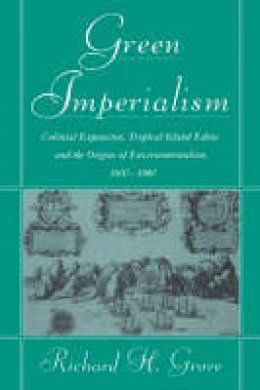'Green Imperialism is a succinct yet richly nuanced study of the genealogy of European environmentalism ...'. Economic History Review ...a fascinating and important book....extremely wide-ranging....Mention must be made of the author's facility in utilizing a remarkable diversity of sources. His understanding of the literature (in many languages) and his wide general knowledge are rare, and, in addition, he writes well....
Read more'Green Imperialism is a succinct yet richly nuanced study of the genealogy of European environmentalism ...'. Economic History Review ...a fascinating and important book....extremely wide-ranging....Mention must be made of the author's facility in utilizing a remarkable diversity of sources. His understanding of the literature (in many languages) and his wide general knowledge are rare, and, in addition, he writes well. The bibliography is excellent and the interesting asides in footnotes, entertaining and informative. H-Net Book Review As a work of global colonial environmental history, this work is unsurpassed. It adds breadth, depth, and new influences; it opens numerous and important avenues for further inquiry. On some levels, it is a pathbreaking book, full of hypotheses to be tested in new and different climates and historical milieus. It sees a vivid environmentalism in colonial history and offers several significant avenues through which to see new trends....This book belongs on the shelf of every environmental historian. For those with particular interest in global relationships, colonialism, and the roots of economy and environment in Africa and Asia, this is a marvelous addition to the literature. Richard Grove has given us one of the most wide-ranging and thought-provoking books of the decade. Hal Rothman, Environmental History A valuable reference for scholars studying European colonial history, anthropology, archaeology, and the environmental movement. Choice Anyone who assumes that environmentalism is a twentieth-century phenomenon concerning primarily European and US problems is likely to find this book illuminating. Richard H. Grove, a leading historian of science in the age of empires, shows in fascinating detail, through the experience and writings of scientists who went out to the colonies, that environmental thought evolved in early modern times (1600s-1800s)....This book is remarkable and may well change the prevailing ideas about a major period in the history of science. It is likely to make impossible some of the generalizations that have become current about the origins of environmental concern. Grove's scholarship is impressive, his literary style is congenial and readable, and his narrative constantly presents newly unearthed facts and interpretations that are unexpected but almost always convincing. J. Donald Hughes, BioScience The great strength of his [Grove] work is its remarkable search for globalization, matched by his own prodigious scholarly travels. He has also produced some convincing internationalization of scientific thought and identified key strands, not least the French derived from Mauritius and the Scots from India. John MacKenzie. International History Review Grove's study of the origins and development of European environmentalism is an outstanding work of interpretive scholarship, even a revolutionary one. It should become required reading for students of European relations. Journal of Interdisciplinary History Grove has set out to write a traditional, primarily European-oriented, intellectual history of the roots of Western environmentalism. He has taken up an enormous challenge. To criticize a few weaknesses is to compliment him for his attempt here at grand theory. This is a volume that will prove to be one of the mainstays of the small but growing encyclopedia of global environmental history. American Historical Review Grove writes a cultured and literate prose that is a joy to read. His jugments are based on solid research in source materials that are found in the European imperial centers and also in the former colonies, some of them scattered and difficult of access. This book deserves a prominent place beside Alfred W. Crosby's Ecological imperialism as a key to understanding the environmental consequences of European worldwide expansion. Although Grove wisely avoids applying his study to the twentieth-century environmental crisis, it seems to this reviewer that his work offers an indispensable background for those who would like to know how the supposed caretakers of the earth arrived where they are today. The first concerns are well chronicled here, as are the first missteps. Journal of World History ...Grove has fused colonial expansion, the roots of modern science, and what he calls the roots of environmentalism in a multi-layered attempt to push the genealogical tree of environmenatlism back in time....Grove pushes us back both further in time and broader in geographic space than any existing history of the roots of environmentalism....As a work of gloabal colonial environmental history, this work is unsurpassed. It adds breadth, depth, and new influences; it opens numerous and important avenues for further inquiry. On some level, it is a pathbreaking book, full of hypothesis to be tested in new and different climates and historical milieus. It sees a vivid environmentalism in colonial history and offers several significant avenues through which to see new trends. Hal Rothman, Environmental History ...this book...forces a vast and new research agenda on environmental history which, when completed, will greatly illuminate our past, and explain a bit better the reasons for our present predicaments. GReen Imperialism will remain a pioneering work, a book that will take its own place in history.... S. Ravi Rajan, Capitalism Nature Socialism
Read less
